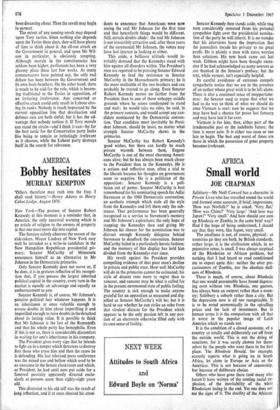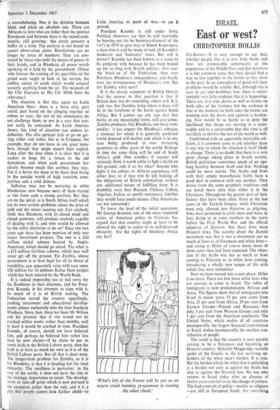Small world
AFRICA JOE CHAPMAN
Salisbury—Mr Nodl Coward has a character in Private Lives who has travelled round the world and formed some accurate, if brief, impressions. `How was Norfolk?' he is asked. 'Very flat.' 'How was China?' Very large.' And how was Japan?"Very small.' And how should one sum up Rhodesia or Zambia in the same brief way? Had I the hope of being understood, I should say that they were, like Japan, very small. The smallness is not, of course, physical: as countries go they are both, by British standards, rather large; it is the civilisation which, in no pejorative sense, is small. I was always sceptical of the Rhodesian or African problem, but nothing that I had heard or read conditioned me to expect quite this : neither the utter pre- cariousness, of Zambia, nor the absolute dull- ness of Rhodesia.
There' is much, of course, about Rhodesia that one would presumably have found depress- ing even without UM. Rhodesia, one guesses, has always been an outpost rather than a coun- try; Salisbury a suburb rather than a city. But the depression now is all too recognisable. It is to be noted economically in the spiralling prices and the lack of investment. But in human terms it is the comparison with all that is worst in the popular image of Latin America which so stands out.
It is the condition of a closed economy, of a country so totally and deliberately cut off from the outside world. This is not the doing of sanctions, for it was surely chosen for them- selves by the people who went there in the first place. The Rhodesia Herald, for example, scarcely reports what is going on in South Africa, let alone in Europe or Asia or the Americas. This is not because of censorship, but because of deliberate choice.
Others who have gone there (and many who haven't) have written of the coming racial ex- plosion, of the inevitability of the white Rhodesians losing in the end. Yet one does not see the signs of it. The docility of the Africans is overwhelming. Nor is the division between black and white an absolute one. There are Africans (a few) who are richer than the poorest Europeans and between there is the mixed com- munity, still growing: this surely presents a buffer of a kind. The analysis is not based on casual observation alone. Revolutions are no longer by force of numbers. They are con- tained by those who hold the means of power in their hands, and in Rhodesia all power worth speaking of is held by the government. (Those who foresee the coming of the guerrillas on the grand scale ought to look to the terrain, the endless extent of scrub which would conceal scarcely anything from the air. The manuals of the Che Guevara or Ho Chi Minh have no relevance.) -
The situation is like- this, again on Latin American lines : there is a basic elite, part social, part based on the clinging together of colour or race; the rest of the community do not challenge them, or not in a way that can- not easily be contained. As Latin America shows, this kind of situation can endure in- definitely. The elite perhaps fails to go on get- ting richer and richer, but as in Uruguay, for example, they do not leave in any great num- bers, though they might export their capital. Long after the time when it is clear that it is useless to hope for a return to the old dynamism, and when each government has clearly become much like another, they stay. For it is better for them to be there than living in the outside world of high taxation, com- petition and a cold climate.
Inflation may not be worrying to white Rhodesians now because most of them started at UDI from such a strong position. But they are on the spiral, as is South Africa itself which has its own serious problems about the price of gold and the mines running out. Can anybody think that Rhodesia, with its closed mind and closed economy, will produce anybody capable of dealing with it, and who would be allowed by the white electorate to do so? Since UDI two years ago there has been mention of only two major investment projects. The one is a £10 million nickel scheme backed by Anglo- American, which should go ahead. The other is a £13 million fertiliser scheme, which may well never get off the ground. Yet Zambia, whose government is at least legal for all its threat of instability, can apparently raise with ease some £30 million for its dubious Kafue Dam project which has been rejected by the World Bank.
It is indeed impossible not to feel sorry for the Zambians in their dilemma, and for Presi- dent Kaunda in his attempts to cope with it. So much of it is of British making. The Federation served the country appallingly, pushing investment and educational develop- ments almost exclusively into the then Southern Rhodesia. Since then, there has been Mr Wilson and his promise that if UDI would not be crushed within weeks rather than months, well at least it-would be crushed in time. President Kaunda, of course, should not have believed him, and perhaps he believed him rather less than he now claims—if he chose to put so much faith in the British Labour party, then the fault is at least as much his own as,it is of the British Labour party. But all that is short term. The longer-term problem for Zambia, as it is for Rhodesia, is that it is heading fast for total obscurity. The smallness is pervasive: in the way of the world, it does not have the size or the strategic importance to count. The develop- ment or take-off point which is now pursued is the exception rather than the rule, and it is a pity that people cannot look farther afield—to
Latin America or parts of Asia—to see it proved.
President Kaunda is still under forty. Political observers say that he will inevitably be bowing out (to be Secretary-General of the UN?) in 1970 to give way to Simon Kapwepwe, a man who is said by many to lack all Kaunda's moderate and 'humanist' views. But will it matter? Kaunda has been known as a name to be conjured with because he has been bound up for so long with British politics : first over the break-up of the Federation, then over Northern Rhodesia's independence, and finally over the consequences of Rhodesia's UDI. But for Zambia what next?
It is the classic argument of British liberals that the answer to that question is that if Britain does not do' something, others will. It is said, too, that Zambia, lying where it does, will be in the forefront of the battle against South Africa. But I cannot see any sign that that battle, in any meaningful terms, will ever come. Zambia produces, like Rhodesia, one basic com- modity : it has copper for Rhodesia's tobacco, a resource for which it is generally predicted world demand will decline and which is in any case being produced in ever increasing quantities in other parts of the world. Perhaps in time the same thing will be said of South Africa's gold. One wonders if anyone will seriously think it worth while to fight a battle on this ground; and, if so, for what? Anyone who fights it for colour, or African supremacy, will either lose, or if they win be left holding all the obligations of British colonialism, without any additional means of fulfilling them. It is doubtful, were they ,Russian, Chinese, Cuban, Algerian, Italian, or openly mercenary, whether they would have much chance. (The Americans are not interested.)
To lower the level of the initial quotation, Mr George Kennan, one of the more respected critics of American policy in Vietnam, has argued that that country ought at least to be allowed the right to return to its well-deserved obscurity. Are the rights of Southern Africa any less?



































 Previous page
Previous page